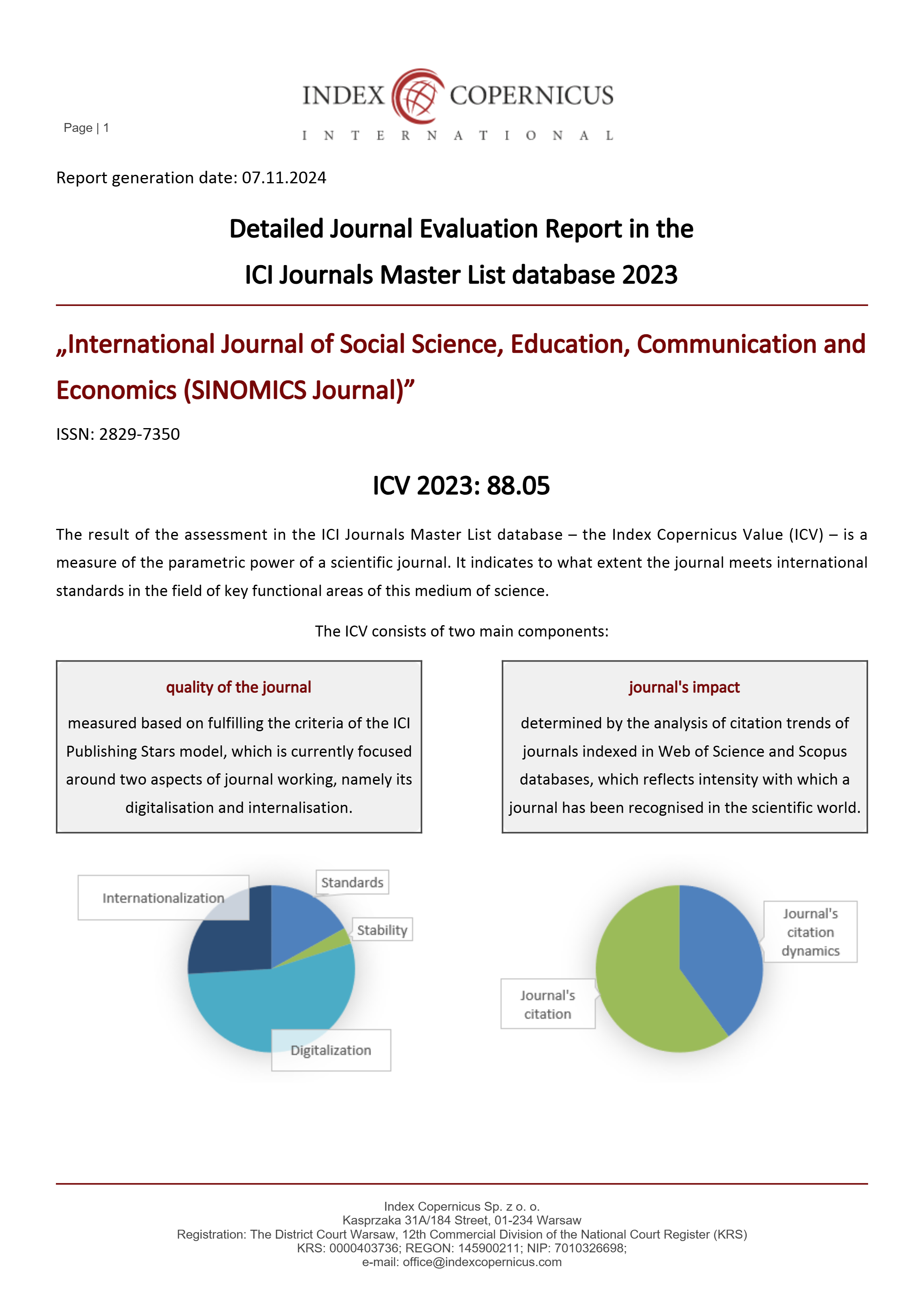Strategy for Handling Conflict Resolution Through a Territorial Development Approach
Main Article Content
Dwi Suharjo
Muhammad Nur Ali
Hasbullah
The aim of this research is to analyze and understand the anatomy of social religious conflict in the Poso conflict as learning through the territorial development approach as a resolution and problem solving strategy. This research uses qualitative research. The researcher's reason is that the problem being studied is very general, dynamic and complex, not an independent reality but an object full of transcendental meaning (religious in nature and difficult to understand). This research procedure was carried out by analyzing the opinions of leadership elements in the Central Sulawesi region, including the military, Civil Officials, NGOs (NGOs) related to conflict studies, Conflict Actors, Religious Leaders, and Social Science Experts. The mediation approach was carried out through territorial guidance by the Indonesian National Land Army apparatus. The research results show that anatomically, the cause of the Poso conflict comes from within the Poso community and not external parties. The Poso conflict was caused by many factors, not only related to religious factors but also the overlap of various factors, such as economic inequality, political institutional crisis, distrust in legal institutions and law enforcement, security crisis and disorientation of socio-cultural values. The resolution is carried out through the territorial development approaches such as (1) the territorial development in the Field of Ideology. (2) the territorial development in the Political Sector which is directed and implemented through non-physical activities, (3) the territorial development through an Economic Sector approach. (4). the territorial development through a Socio-Cultural Sector approach. which is directed at developing community aspects of culture and social ethics. (5) Special Assistant in the Field of Defense and Security. which is directed at community development in the field of public security defense. Based on the research results, it is recommended to central and regional leaders that the Poso Complex should be used as an event for valuable learning and serious understanding of conflict triggers (triggers), basic causes of conflict (pivotal factors), factors that mobilize conflict (mobilizing factors), as well as factors which exacerbate the conflict (aggravating factors). Then it is recommended that the TNI be able to carry out intensity and existence as well as professionalism of territorial development by Indonesian National Army officers from the army headquarters in their subordinate units such as military area commands, military resort commands, and military district commands and their staff to be able to detect symptoms of more vital factors. early so that the symptoms of conflict can be controlled.
Abdullah, Amin. “Religious Violence: Its Origin, Growth and Spread,” Kuliah Umum: Filsafat Agama dan Resolusi Konflik di Universitas Islam Negeri (UIN) Sunan Kalijaga tahun 2010.
Aragon, Lorraine (2001). "Communal Violence in Poso, Central Sulawesi: Where People Eat Fish and Fish Eat People". Indonesia. Southeast Asia Program Publications (72): 45–79.
Aragon, Lorraine (2005). "Mass Media Fragmentation and Narratives of Violent Action in Sulawesi's Poso Conflict". Indonesia. Southeast Asia Program Publications (79): 1–55.
Axt, Heinz-Jurgen. (2006). Conflict, A Literature Review. Research Report. Institute for Political Science University of Duisburg-Essen.
Barron, Patrick, Smith, Claire Q, Woolcock, Michael. (2004) Understanding Local Level Conflict in.
Berhe, Tadesse dan Adaye Yonas. Tanpa tahun. Afar: The Impact of Local Conflict on Regional Stability. Research Report. Centre for Policy Research Dialogue (CPRD) dan Institute Security Studies (ISS).
Bertrand, Jacques. (2004). Nationalism and Ethnic Conflict in Indonesia. Cambridge, Cambridge University Press.
Braithwaite, John; Braithwaite, Valerie; Cookson, Michael; Dunn, Leah (2010). Anomie and Violence: Non-truth and Reconciliation in Indonesian Peacebuilding. Canberra: ANU E Press.
Brown, Graham; Tajima, Yukhi; Hadi, Suprayoga (2005). Piza-Lopez, Eugenia, ed. Overcoming Violent Conflict: Peace and Development Analysis in Central Sulawesi. Overcoming Violent Conflict (3). Jakarta: Badan Perencanaan Pembangunan Nasional.
Choppel, Charles (Eds.) (2006). Violent Conflicts in Indonesia: Analysis, Representation, Resolution. London: Routledge.
Centre for Humanitarian Dialogue. (2011). Conflict Management in Indonesia – An Analysis of the Conflicts in Maluku, Papua and Poso The Indonesian Institute of Sciences, Current Asia and the Centre for Humanitarian Dialogue.
David O. Sears, Jonathan L. Freedman, dkk, Psikologi Sosial Jilid 1. Jakarta: Erlangga, Edisi Kelima. 1988.
Developing Countries: Theory, Evidence, and Implications from Indonesia. Research Report.Social Development Department, The World Bank.
Edi Santoso dan Lili Budiati, Manajemen Konflik. Tanggerang Selatan : Universitas Terbuka, 2014.
Engel, Jacob D. Gereja dan Masalah Sosial. Salatiga: Tisara Grafika, 2007.
Engel, Jacob D. Gereja dan Masalah Sosial (Salatiga: Tisara Grafika, 2007), diakses dari https:// id.wikipedia.org/wiki/Agama-di-Indonesia#Hubungan-antar-agama pada 12 Maret 2023 pukul 07.44 p.m.
Furlong, Gary T.(2005). The Conflict Resolution Toolbox: Models and Maps for Analyzing, Diagnosing and Resolving Conflict. Ontario, John Wiley and Sons Canada, Ltd.
Hanafi, Pengantar Teologi Islam. Jakarta: Al-Husna Zikra, 2001.
Institute for Peace and Conflict Resolution. (2002). Conflict Analysis. Conflict- sensitive Approaches to Development, Humanitarian Assistance, and Peace Building: Tools for Peace and Conflict Impact Assessment.
Jurnal Waskita Vol.II No. 2, Nov.2005 oleh Liek Wilardjo dalam artikel “Persrawungan Ilmuwan-Agamawan: Dialog Menuju Kemungkinan Integrasi?”
Kimball, Charles. When Religion Becomes Evil. New York: Harpercollins Publishers,Inc, First Edition. 2002.
Litaay, Theofransus L. A., dkk. Manajemen Konflik: Materi Pelatihan Untuk Stakeholder. Sulawesi Tengah: Poso. 2007.
Nelson-Pallmeyer, Jack. Is Religion Killing Us? New York: Trinity Press International. 2003.
Pancasila, Skep Danseskoad No. 52-07-B1-A0101 a, hal. 3-13. Diakses pada tanggal 17 April 2023.
Tim Balitbang PGI. Meretas Jalan Teologi Agama-agama di Indonesia: Theologia Religionum. Jakarta: BPK Gunung Mulia. 2003.
Undang-Undang Dasar 1945, Skep Danseskoad No. 52-07-B1-0101b, hal. 9-25. Diakses pada tanggal 17 April 2023.
Wawasan Nusantara, Skep Danseskoad No. 52-07-B1-0106a, hal. 3-8. Diakses pada tanggal 17 April 2023.
Weni Puspita, Manajemen Konflik (Suatu Pendekatan Psikologi, Komunikasi, dan Pendidikan). Yogyakarta : Deepublish, 2018.
Yewangoe, A. A. Iman, Agama dan Masyarakat Dalam Negara Pancasila. Jakarta: BPK Gunung Mulia, 2002.










